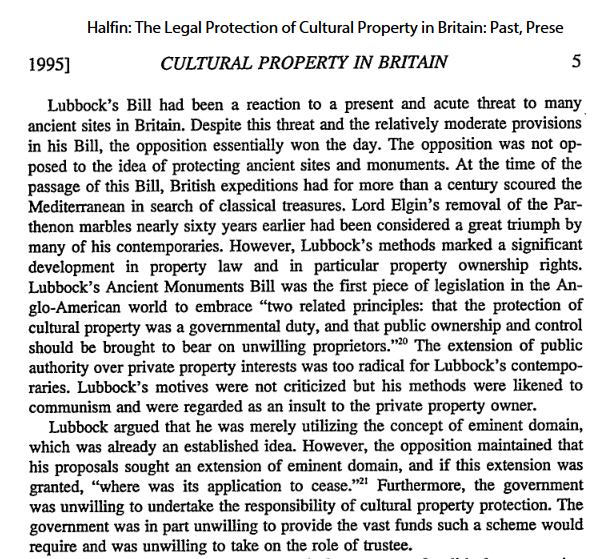Simon Heffer, writing in the Telegraph, eggs on the culture secretary Oliver Dowden to remove the charitable status of heritage bodies which are “hijacked by activist sentiment”. This may be one of the worst articles I've ever read.... 1/ https://www.telegraph.co.uk/art/architecture/heritage-summit-will-british-cultures-last-stand-against-woke/
It’s because of ‘activist sentiment’ that we have so much heritage in the UK in the first place. My great grandfather, an MP in the 19th century, introduced a bill in 1873 to protect heritage sites. It was blocked by the Tories as it threatened private landowners’ interests.
The Bill would have allowed the government to compulsorily purchase heritage sites from private landowners if the landlord wanted to develop the site. The Tories accused him of being some kind of communist for wanting to seize private property.
Mr Beresford Hope, opposing the bill, said “What startled [me] most was the invasion of all principles of property, not to say the Communistic doctrine which was established, when a man by agreement or sale allowed another to break in his gate to make a grievance out of this”.
Bloody 19th century grievance studies heritage activists! Trying to stop Lord Whatshisface from bulldozing an ancient burial mound. It’s communism, you hear!
Meanwhile, the statue of slave trader Edward Colston would not be erected in Bristol for another 20 years, in 1895.
Meanwhile, the statue of slave trader Edward Colston would not be erected in Bristol for another 20 years, in 1895.
In 1871, my great grandfather bought much of the land in the village of Avebury to stop the neolithic monument there being destroyed. It’s now a UNESCO world heritage site. The fact that British heritage is so well preserved is because of activists campaigning to protect it.
In the Telegraph, Heffer says “It is one thing to re-interpret history using legitimate, accurate and relevant facts: it is quite another to weaponise it in the cause of some aggressive ideology”. This is funny, as it is exactly what Heffer and the Conservatives are now doing.
Academics and activists are questioning the economic and political basis on which the power of the British ruling class is built. The govt and right wing media are threatened by this, and so they are trying to silence those who question whether it’s right to lionize slave owners.
Heffer is presumably also annoyed about a National Trust initiative to explore the history of National Trust properties linked to the slave trade. Prof Corinne Fowler, who leads the project, recently told a Telegraph podcast that her own family had been slave traders.
Fowler said that “it's just really important not to weaponize this subject, but to talk about it sensibly”. Simon Heffer might want to take note as he encourages the government to cut charity funding for bodies that he thinks are too left wing. https://www.telegraph.co.uk/politics/2021/02/14/national-trust-academic-leading-review-stately-homes-admits/
Heffer even claims to know that God would not want statues of slave traders removed, because, “Since God is supposedly about forgiveness, a memorial to a long-dead slave-owner or someone who profited by that iniquitous trade is a memorial to someone whom God has forgiven”.
He then chides the Archbishop of Canterbury for calling for a review of CoE statues, because this shows the Archbishop thinks “he knows better than Him.” Heffer has just said he thinks that God approves of statues of slave traders. Does he have a direct line to the almighty?
It was only in 1913 that the Ancient Monuments Consolidation & Amendment Act allowed the government to issue preservation orders for heritage sites in danger . Before this, any landowner could destroy a piece of heritage on their land and nobody could do anything about it.
The kind of heritage that matter to people like Heffer is property. Where the past produced no monuments, it can be forgotten, like the victims of slavery themselves. But the monuments built to the slave owners are blessed by God himself, and must never be removed.
This is part of a necessary conversation about Britain’s past and how it affects our society now. One side wants to talk about the painful memories that have been buried. The other side wants to cancel charity funding for talking about that past.

 Read on Twitter
Read on Twitter


